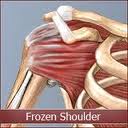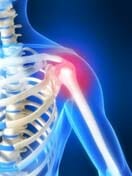Frozen Shoulder Treatment
Electra Health provides treatment for frozen shoulders at Vancouver clinic
Our downtown Vancouver clinic has over 20 RMTs on staff,
several of whom are professionally trained to treat frozen shoulder.
Frozen Shoulder Treatment
Vancouver Massage Therapy Clinic
Electra Health – 970 Burrard Street, Vancouver BC
Open 7 days a week from 8 am to 8 pm
604-685-4325 (HEAL)
What is a frozen shoulder?

Frozen shoulder is a layman’s term used for the condition of Adhesive Capsulitis. Capsulitis refers to the capsule of the shoulder, “itis” refers to inflammation and adhesive refers to the fact that the inflammation has caused the capsule to become adhered to. When the capsule gets inflamed, the body forms fibrin (scar tissue) to heal the area. This scar tissue is what causes the capsule to become adhered to, and the result of the build-up of the fibrin causes the shoulder to become “frozen”. Frozen shoulder is a very painful condition that causes a range of motion to become very limited, making simple tasks like combing your hair or reaching the upper shelf very difficult.
What causes a frozen shoulder?
The answer to this question is unclear. There is no known or exact cause but there are some predominant factors associated with those who suffer from the condition. For example, frozen shoulder is predominantly associated with female patients around the age of fifty. In Japan, it is so common that they call it the fifty-year-old shoulder. It’s unclear why this is the case, but it may be related to menopause and hormonal changes. Other related causes seem more clear, such as developing a frozen shoulder following a fall or traumatic events such as a motor vehicle accident, or a FOOSH injury (falling on an outstretched hand).

The stages of frozen shoulder
The progression of the condition can be broken down into three stages: the freezing stage, the frozen stage, and the thawing stage.
The Freezing Stage
This is the beginning stage during which the tissue around the shoulder is highly inflamed, making it the most painful stage. The inflammation manifests five cardinal symptoms: Pain, Swelling, Heat, Redness, and Loss of function. Often the pain wakes the sufferer throughout the night.
The Frozen Stage
This is when the initial inflammation has subsided due to the fact that the body has laid down a lot of fibrin (scar tissue) in order to reduce it. The buildup of fibrin “freezes” and drastically limits the range of motion of the shoulder.
The Thawing Stage
This is when the shoulder starts to become mobile again as it “unfreezes”. One explanation as to why this occurs is that because the condition is no longer painful—since the inflammation has been reduced by the fibrin—the person can slowly begin to move the shoulder again with little to no pain. The movement causes the joint to produce a lubricant called synovial fluid. Like grease for the joint, the fluid works its way into the capsule. As the joint becomes more and more lubricated, the fibrin (scar tissue) starts to break up and is reabsorbed by the body. Mobility and function return and the cycle is complete.
Is there any treatment for frozen shoulder?

There are a number of treatment options that can reduce the pain and help the condition to move through the stages faster. During the first stage, the treatment is primarily pain management. Gentle massage and passive range of motion techniques help to maintain mobility and relieve some of the pain. Also, ice applications can help inhibit the inflammation, thus reducing the pain experienced. However, please take care not to over-cool the skin as it can cause an ice burn.
During the second stage, massage and the introduction of stretching and joint mobilizations help to restore mobility. Specific exercises can help prevent muscular wasting (atrophy) and maintain joint biomechanics and integrity, which help in the production of the synovial fluid that is so important to the process of “thawing” the shoulder.
Once the condition has entered the thawing stage, it is helpful to ensure that proper exercise techniques are performed as the range of motion increases. Again, joint mobilizations expedite the recovery process since they help to increase further production of synovial fluid, which in turn helps break down the scar tissue. Continued massage is recommended to help with muscular tension and soreness associated with the longer-term immobility brought on by the condition.
If you wish to be assessed or treated for a frozen shoulder in Vancouver, please make an appointment with any of the following practitioners:
We have over 20 RMTs on staff, several of whom are professionally trained to treat frozen shoulder – Vancouver Massage Therapy Clinic
Frozen Shoulder Treatment
Vancouver Massage Therapy Clinic
Electra Health – 970 Burrard Street, Vancouver BC
Open 7 days a week from 8 am to 8 pm
604-685-4325 (HEAL)
BACK to Massage Therapy Clinic



